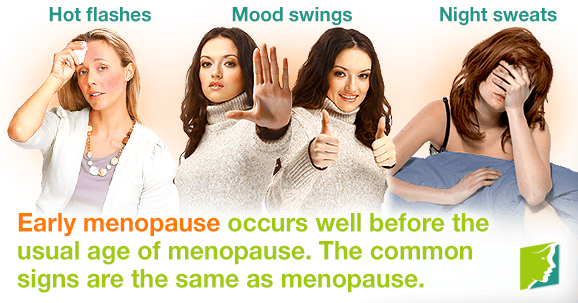Are you in your 20's, 30's, or early 40's, and wondering if what you are experiencing is early menopause? Although uncommon, it is possible to go through menopause early.
What Is Early Menopause?
Early menopause, according to the North American Menopause Society, is menopause that occurs well before the usual age of menopause, at the average age of 51. Some sources designate the age of 45 as the cutoff, and label any menopause occurring prior to age 45 as early.
Early menopause may occur naturally, or it may be induced by surgically removing or damaging the ovaries (i.e., hysterectomy or polycystic ovary syndrome), or as a side effect of medical treatments like chemotherapy.
Signs of Early Menopause
The commons signs of early menopause are the same as menopause itself, and if you find yourself frequently suffering from more than one of these, then you should talk to your doctor who will be able to confirm that early menopause is the cause of your symptoms. These symptoms can include:
Hot flashes
Hot flashes are the emblematic symptom of menopause, and they are by far the most common menopausal symptom. Hot flashes feel like a sudden, intense burst of heat is engulfing the body. Different women describe hot flashes differently and hot flashes can be accompanied by irregular heartbeats and perspiration. The severity and frequency of hot flashes vary from woman to woman.
Mood swings
Some women going through menopause experience mood swings. Mood swings can strain personal relationships and be stressful for the person experiencing them. Mood swings caused by hormonal fluctuations can cause a person to react differently and feel more strongly about certain things.
Night sweats
These are very similar to hot flashes except for the fact that night sweats occur while you are sleeping, and are accompanied by excessive perspiration. Night sweats can cause a woman to wake up, and if night sweats happen frequently, this can greatly disturb a woman's sleep pattern.
Irregular periods
Women going through menopause frequently experience irregular periods. This can come in the form of heavier and longer periods and/or sporadic or missed periods. This is because menopause is when a woman's ovaries produce less hormones, and hormones are what regulates menstruation. Although there are many other reasons why you could be experiencing irregular periods, it is important to talk to your doctor to find out the cause.
It is also important that you see a doctor if you think you are going through premature or early menopause. This is because women who go through early or premature menopause are at a higher risk for some diseases and conditions, so it is important to have a conversation with your doctor about any potential treatments or lifestyle changes. Click in the following link to learn more about treatments for early menopause
Sources
- Shuster, L. T., Rhodes, D. J., Gostout, B. S., Grossardt, B. R., & Rocca, W. A. (2010). Premature menopause or early menopause: long-term health consequences. Maturitas, 65(2), 161. doi:10.1016/j.maturitas.2009.08.003
- Jean Hailes for Women's Health. (2014). Premature and early menopause. Retrieved from http://www.betterhealth.vic.gov.au/bhcv2/bhcarticles.nsf/pages/Menopause_premature_early_menopause




